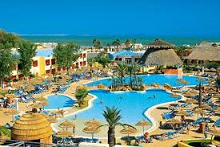 Editor : Anima, studies n°17, june 2006
Editor : Anima, studies n°17, june 2006
Author : Fabrice Hatem
The rapid development of international tourism over the past 50 years has opened up opportunities which the MEDA countries have started to take advantage of. Tourist activity contributes, directly or indirectly, more than 10 % of GDP and employment in this group of countries. However, their share of the world market remains relatively limited: 50 million entries in 2004, that is 6.6 % of the world total[1]… Despite the impressive tourist potential of the Mediterranean region, the boom in this activity is in fact hampered by a whole series of factors: political instability, an insufficient accommodation offer and the quality and quantity of services, poor diversity of produits offered, competitiveness of competing regions such as South East Asia.
The situation does, however, differ a great deal from one country to another. Turkey, for example, is already a major tourist destination. Tourism represents the leading economic sector in Malta and Cyprus. Israel and Lebanon attract high purchasing power tourists to whom they offer a quality range of services. Egypt and Morocco, as well as Tunisia, have already started to diversify their potential (for example, medicalised tourism in Tunisia). The latter does, however, remain widely under-exploited in countries the likes of Algeria, Syria and Palestine, and to a lesser extent in Jordan.
There is a debate in several countries about the opportunity of making tourism a priority development focus. The existence of negative environmental and social impacts, the dependence on a very seasonal entry flow sensitive to political events, and then the heavy investments necessary over the whole sector are often mentioned in this context. Three types of argument lead, however, to the belief that the development of this sector is desirable in the MEDA countries. Firstly, it is an activity with a high service and employment content and could represent an important source of income in strong currencies. Then, the dynamism of the world market, the proximity of two large regions at the origin of the tourist flows (Europe and the Persian Gulf), the importance of local potential (quality of the climate, diversity of the landscape, cultural heritage, traditions of hospitality), the very positive image of the Mediterranean, represent as many factors for growth. Finally, «sustainable» tourism respectful of the environment and well-integrated into local society, constitutes a structural factor of economic development: the improvement of the quality of the offer of private (accommodation, transport) and collective (health, security, environment and lifestyle…) services, the opening of mentalities, contribute to the international renown of the host country.
The majority of the countries in the region are therefore banking heavily on the development of this activity. Several of them have introduced ambitious development programmes, based upon the modernisation and the extension of the accommodation offer, an improvement in the quality of the services, diversification and an increase in the range of products offered.
These objectives assume, of course, a coordinated mobilisation of the local players in the sector. But they will doubtless not be able to be achieved without the assistance of the international companies in the sector. The latter could especially provide capital and knowhow, contribute to the quantitative growth of the accommodation capacity and the upgrading of the local offer to international standards, play the role of catalyst for the definition of products to suit the expectations of the consumers and market trends, and finally support the promotion of the country by including the products in their catalogues and marketing them through their networks.
It is, however, more than a truism to say that the MEDA countries do no, for the moment, represent a major priority for a large part of the players in the sector, whether it be hotel chains, distributors or above all tour operators, who, thanks to growing marketing power, play a key role in the definition of tourist products and their commercialisation. Despite a few exceptions, such as Accor or the Club Mediterranée, as well as certain investors of Gulf States origins, the large international operators have not for the moment invested massively in the region.
An improvement in the attractiveness of the region for these operators assumes complementary action on three levels: at global level, an improvement in the general business climate and the image of the MEDA countries among investors; on a sectoral level, definition of consistent policy for the development of tourism, incorporated in a wider approach to regional planning, based on an objective evaluation of local potential and market trends and involving all the actors concerned; finally, the implementation of a targeted promotion/prospection policy among the different international players in the sector and intended to exploit the national potential as well as that of the region as a whole. One can thus imagine the creation of a «Mediterranean» brand of circuits associating several countries and joint promotional actions in different areas. The investment promotion agencies could play a significant role in this field.
To download this study, click on one of the following links : tourism or http://www.animaweb.org/fruploads/bases/document/Tourisme_en.pdf
[1] It should be remembered that France alone, plays host to around 75 million tourists each year, with, it is true, a large part of transit tourism
to download this study, click on the following link :